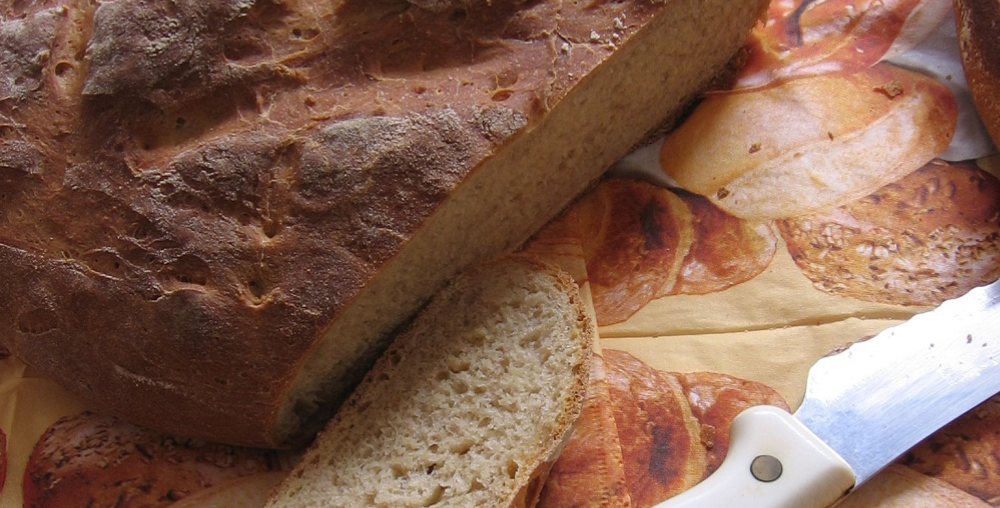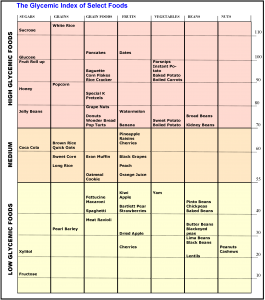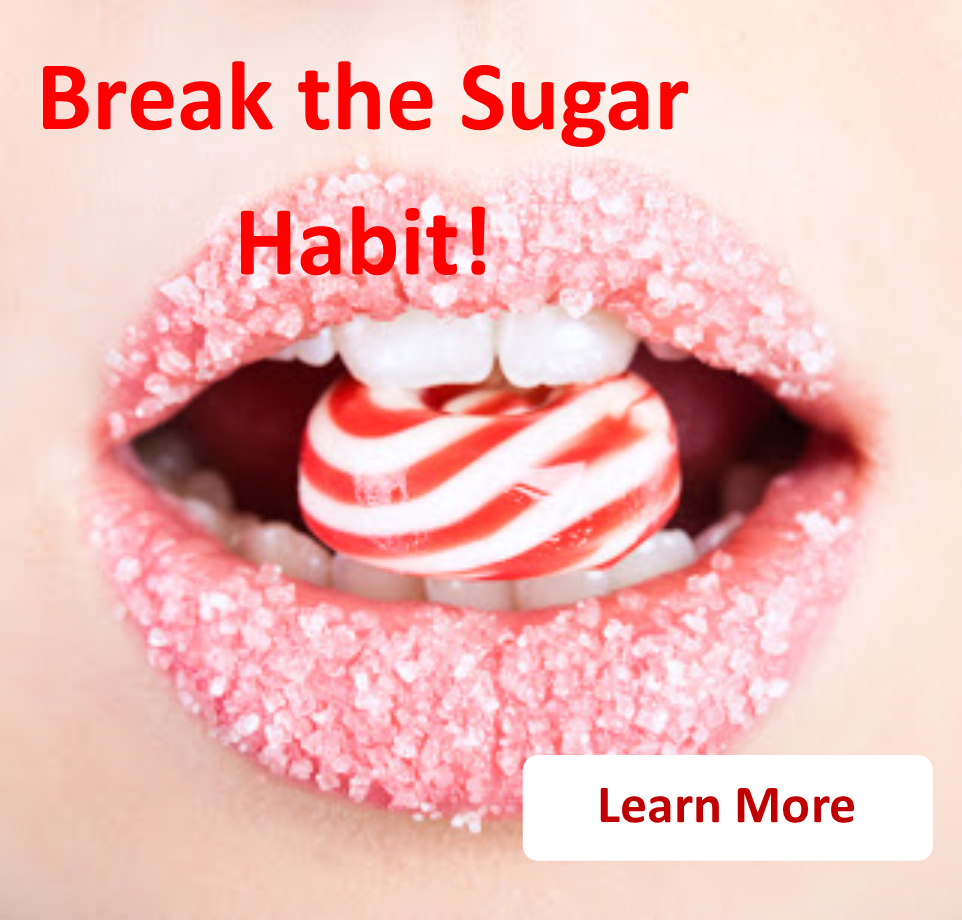I write a lot about sugar and foods that act like sugar in this blog.
Lately, I’ve been getting questions about what I mean by “foods that act like sugar,” so here is the explanation and it all start with an understanding of the glycemic index.

The Glycemic Index
By now, most people have heard of the glycemic index, but I’ll take a moment to explain it.
The way the glycemic index works is that a scientist will measure the blood sugar of a volunteer and then feed that volunteer a single food. After two or three hours, the volunteer’s blood sugar is measured again. What scientists have discovered through this kind of testing is that certain foods increase blood sugar a little, others increase blood sugar moderately, and still other foods increase blood sugar dramatically.
While there are complicated glycemic index charts that show hundreds of foods, here is a typical one:
What you want to notice about this list is that sugars (left-hand column) are mostly in the high top part of the chart. Sucrose (table sugar) and glucose are always found near the top, but, here is the kicker: so are white rice, pancakes, bread, corn flakes, crackers, parsnips, potatoes and many other foods. These are the Foods That Act Like Sugar in your body.
Here is a partial list of foods that act like sugar
GRAINS
- Brown rice
- Glutinous rice
- Instant rice
- Jasmine rice
- Long grain rice
- Parboiled rice
- Sweet corn
- White rice
- Wild rice
GRAIN PRODUCTS
- Breads (all breads)
- Bagel
- Baguette, white
- Blueberry muffin
- Bran muffin
- Corn tortilla
- English Muffin
- Kaiser bread rolls
- Rice Pasta
- White bread
- Whole Grain bread
- Wonder Bread™
Breakfast Cereals (almost all)
- Cheerios™
- Coco Pops™
- Corn Chex™
- Corn Pops™
- Cornflakes™
- Crispix™
- Grapenuts Flakes™
- Grapenuts™
- Instant Cream of Wheat
- Life ™
- Quick Oatmeal
- Raisin Bran™
- Rice Chex™
- Rice Krispies™
- Shredded Wheat™
- Special K™
- Special K™
- Total™
Crackers and Chips (almost all)
- Corn chips
- Popcorn
- Potato chips
- Pretzels
- Puffed rice cakes
- Rice cracker
- Soda Crackers
- Water crackers
Other Breakfast Foods
- Croissant
- Cupcake
- Doughnut
- Muffins
- Oatmeal muffin
- Pancakes
- Pop Tarts™
- Waffles
Cakes
- Almost all cakes
- Angel food cake
VEGETABLES
- Carrots, boiled
- French fries
- Parsnips
- Potato: Baked, Instant, Mashed
- Pumpkin
- Sweet potato
- Tapioca
FRUITS
- Banana
- Dates, dried
- Raisins
- Watermelon
Fruit Products
- Fruit Roll-Ups®
- Fruit Juices
- Jams and Jellies
- Processed fruit bars, fruit wraps…
SUGAR AND SUGAR SNACKS
- Most sugary snacks
- Candy Bars
- Glucose
- Honey
- Jelly beans
- Sucrose
- Syrup
DRINKS
- All fruit juices
- All sodas
- Most sport drinks
DAIRY
- Yoghurt, low fat
- Ice cream
BEANS
- Broad beans
- Kidney beans
OTHER
- Macaroni and Cheese
- Pizza, cheese
- Popcorn
- Soup, green pea
- Soup, split pea
A Sugar is a Sugar
The take home message from the studies done on glycemic index is that a sugar is a sugar, no matter what the source. To your body, it doesn’t matter if you pick up a tablespoon of sugar and put it in your mouth, or if you pick up a baguette and start munching on it: the results are the same. Up up up goes your blood sugar every time you eat these foods.
If you want to maintain good blood sugar control, I always recommend eating low or below the glycemic index.















Hi, I’m just wondering if you know about coconut sugar? Does it act like sugar in the body? And id the GI at 35, or am I misguided?
Hi Anniken,
Coconut sugar does appear to have a low glycemic index (in part because it contains some small amount of fiber), but it still contains fructose (even though much of the web claims it does not). Fructose, as you may know, is much worse than glucose for you. I would avoid it.
Best of luck,
Dr. Scott
Wow i did not realize!!! What an eye opener..
Hi, I have been avoiding pasta. I am wondering why pasta is considered low-glycemic and good for your blood sugar when it is made from grains.
Thank you,
Joyce
Great question! Pasta showing up lower on the glycemic index is one of the mysteries of the glycemic index. As you may know, the glycemic index is not a calculation, but scientists actually measure the change in someone’s blood sugar after eating a meal and then assign a score to that reading. Pasta has always scored lower than many grain-based foods. Scientists think that it has to do something with it being cooked in water and the pasta created a goop-like-barrier (how is that for a scientific term?) and that barrier means that it is harder for the digestive juices to break down the carbohydrates and that means the sugars from the pasta go into the bloodstream slower.
I still think that there are many reasons to avoid grains most of the time and while pasta is better than most grains and grain-products, it still is pretty high.
Hope that helps!
Dr. Scott
Hi,
I am just starting this program and am wondering about how coffee
effects your sugar levels or cravings? Is coffee ok on this sugar free diet?
Joyce,
Coffee can either be no problem, or can be a big problem. It all depends on the person. There is some research that suggests that coffee drops blood sugar (and, would therefore increase cravings). There is also some other evidence that suggests coffee is a lot like other addictions and that you should avoid them all when you are stopping sugar. I’ve found that it depends on the person. Watch and see how you feel.
Dr. Scott
Hi
I’m on board with all of what you are telling me but I have to
Use caution because if I take this all the way too soon I will not make it …I’ve tried Atkins and beyond the second week I just couldn’t go further so I’m taking it slow …….
I no longer drink soda of any kind
And cut out fast food, and candy ESP . Chocolate …..
I don’t buy anything that has sugar in it ……snack foods.
So I figure that I’m half way there.
Thanks for all this info
Cathy
Cathy, sounds like you are taking a good approach! Some people choose to start by staying away from sugars and added sugars and then moving on to the foods that act like sugars. You know yourself best.
Good luck!
Dr. Scott